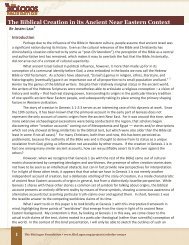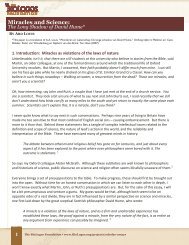What Scientists Do In this scholarly essay, Steve Benner - BioLogos
What Scientists Do In this scholarly essay, Steve Benner - BioLogos
What Scientists Do In this scholarly essay, Steve Benner - BioLogos
You also want an ePaper? Increase the reach of your titles
YUMPU automatically turns print PDFs into web optimized ePapers that Google loves.
The <strong>BioLogos</strong> Foundation • www.<strong>BioLogos</strong>.org/projects/scholar-<strong>essay</strong>s<br />
Above all, we teach scientists to distrust all measurements, but to distrust most those that confirm<br />
what we want to believe. All experiments should be repeated to make certain that their results are<br />
reproducible, of course. But the experiments that are most in need of reproduction are those that<br />
produced data that support the proposition or theory that the student wants to support.<br />
<strong>Scientists</strong> can also deliberately set goals to drive discovery. One way is through "synthesis", the act<br />
of creating something new following a design based on currently accepted theory. Synthesis has become<br />
especially big in biology, where "synthetic biologists" try to create new proteins, or new genetic systems, or<br />
new genetic regulatory networks based on what we think we know about living systems. If the theory<br />
guiding our design is correct, it should be empowering; the synthetic protein, the synthetic gene, or the<br />
synthetic regulators should work. But if the theory is wrong, it might not be empowering. The synthesis will<br />
then fail, and fail in a way that cannot be ignored. Thus synthesis drives discovery and paradigm-change in<br />
ways that analysis cannot.<br />
But suppose scientists do not establish <strong>this</strong> kind of dialectic internally Suppose the scientist,<br />
enamored with his innovation, simply becomes an advocate, publishing data to support the innovation<br />
while burying data that contradicts it, rationalizing away contradicting observations by introducing ad hoc<br />
explanations <strong>In</strong> <strong>this</strong> case, the scientist has lost for himself the power of science to discern knowledge. His<br />
innovation must now be evaluated by the community.<br />
Fortunately, the community of science offers the opportunity for correction. Unlike in the law,<br />
advertising, or politics, science does not have a jury, market, or voter who stands above the dispute, hears<br />
both sides, and makes an authoritative decision. <strong>In</strong>stead, there are rules that deny the existence of an<br />
authority. Data are made public. Experiments are open to be repeated in the laboratories who want to<br />
attack the innovation. New experiments are designed by others to test the innovation.<br />
The interaction can be rough and tumble, with advocates on all sides showing little of the<br />
dispassionate disengagement of ideal scientists. Sometimes, the dispute is not resolved until the<br />
advocating scientists die, to be replaced by a new generation of scientists who can dispassionately evaluate<br />
the dispute. But as long as politicians do not intervene, science can be self-correcting.<br />
<strong>In</strong> <strong>this</strong> activity, a community can easily become divided into warring parties of advocates. One of<br />
these disputes is well known to biologists (but to few other communities of scientist) is the "neutralistselectionist"<br />
dispute, which consumed a generation of evolutionary biologists arguing over whether or not<br />
most genetic change influenced the fitness (of a moose, for example).<br />
A dispute well known to chemists (but to few other communities of scientist) is the "non-classical<br />
carbocation" dispute, which asked how bonds should be represented in organic molecules carrying a<br />
positive charge. Known to physicists (but to few other communities of scientist) is the dispute over the<br />
"Copenhagen interpretation", having to do with uncertainty and quantum mechanics. <strong>In</strong> each dispute,<br />
every observation presented by one side was immediately contradicted by data selected by the other. The<br />
debates were largely unresolved until the initiating protagonists had left the stage.<br />
How should a community react when our paradigms are challenged Certainly, we cannot drop<br />
everything every time some crackpot decides to challenge what he learned in middle school. Nor can we<br />
expect scientific communities, composed of individual humans, to be more liberal than other human<br />
communities, where a challenge to orthodoxy is generally met by a response equivalent to "kill the<br />
heretic".<br />
But a scientist is not allowed to dismiss <strong>this</strong> challenge out of hand as ridiculous. <strong>Scientists</strong> need a<br />
process to balance the fact that settled science may be wrong against the need not to waste time with truly<br />
ignorant challenges to science.<br />
7<br />
<strong>What</strong> <strong>Scientists</strong> <strong>Do</strong><br />
BY STEVEN BENNER




